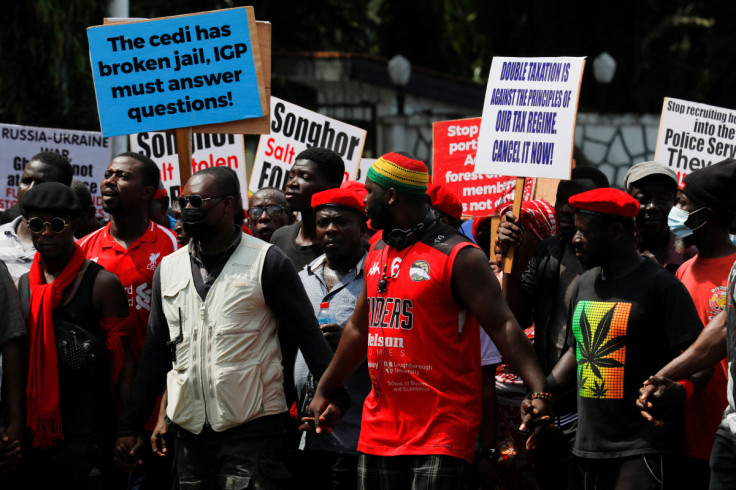Explainer-Who Holds Ghana's Debt And What Restructuring Is Planned?

Ghana has begun restructuring its debt by rolling out a plan to swap $10.5 billion in local bonds with new ones, seeking IMF help and by preparing a proposal to restructure its foreign debt as the West African country struggles with its worst economic crisis in a generation.
WHY THE NEED TO RESTRUCTURE?
Inflation in Ghana has soared in 2022 to a 21-year peak of 40.4% annually in October. Several steep interest rate hikes - the most recent by 250 basis points to 27% in November - have failed to check rising prices.
The cedi has lost more than 50% of its value this year, pushing up the cost of Ghana's external debt.
The gold, cocoa and oil producer has been locked out of international markets as the premium demanded by investors to hold its debt over safe-haven U.S. Treasuries has been above the 1,000-basis points mark for most of the past 12 months. The spread is currently at over 3,000 bps.
Ghana's domestic borrowing costs have soared. Finance Minister Ken Ofori-Atta said on Monday interest payments were consuming between 70 and 100% of government revenues. Other than default-striken Sri Lanka, that is the worst statistic in the world, according to credit rating agency Fitch.
HOW BIG IS GHANA'S DEBT?
Ghana's public debt was 467.4 billion cedis ($37.4 billion) in September, of which 42% was domestic debt, according to the most recent central bank figures released last month.
It is now more than 100% of GDP, Ofori-Atta said on Monday, as he announced some of the plans the government hopes will bring that ratio down to 55% by 2028.
The country is at high risk of debt distress, he said last month while presenting the 2023 budget.
WHO OWNS GHANA'S DEBT?
Commercial banks held a third of the domestic debt of Ghana and its state-owned enterprises at the end of September, according to the country's Central Securities Depository. Other major holders include foreign investors, pension funds and the central bank.
Ghana has $13 billion in Eurobonds, with holders including major global asset managers such as BlackRock, Vontobel, AllianceBernstein, Neuberger Berman and PIMCO, according to recent filings.
It is not clear if a $1 billion 2030 Eurobond, which has a $400 million World Bank guarantee and is trading well above other non-guaranteed bonds, will be included in the debt restructuring.
At the end of 2021, Ghana had $3.2 billion of bilateral debt and $6.3 billion with multilateral institutions, $4.6 billion of that with the World Bank, according to World Bank data.
WHAT IS GHANA PROPOSING?
Ofori-Atta on Monday announced a plan to exchange the country's local bonds worth about 137.3 billion Ghana cedis ($10.5 billion) by Dec. 19.
More than 60 local bonds maturing between 2023 and 2039 will be exchanged for new ones maturing in 2027, 2029, 2032 and 2037, with the annual coupon set at 0% in 2023, 5% in 2024 and 10% from 2025 until maturity.
The country's central bank on Friday announced relief measures for banks participating in the bond exchange, which followed treasury and debt management director Samuel Arkhurst warning on Wednesday that large holdouts would spell "trouble".
A $1.2-billion financial stability fund is being set up to cushion the impact on the financial sector. External debt restructuring plans would be announced in "due course", Ofori-Atta said on Monday.
WHAT ABOUT THE IMF?
Ghana's government sought help from the IMF in July, going back on its pledge to never to do so. Ofori-Atta said it was looking at a three-year programme potentially worth between $2 billion and $3 billion.
An IMF team is visiting Ghana from Dec. 1 to 13. The fund is yet to comment on Ghana's debt sustainability or domestic bond exchange plans.
Ghana's economic recovery could be delayed and complicated if the IMF team leaves without a staff level agreement, Arkhurst said on Wednesday. ($1 = 12.5000 Ghanian cedi)
© Copyright Thomson Reuters 2024. All rights reserved.





















